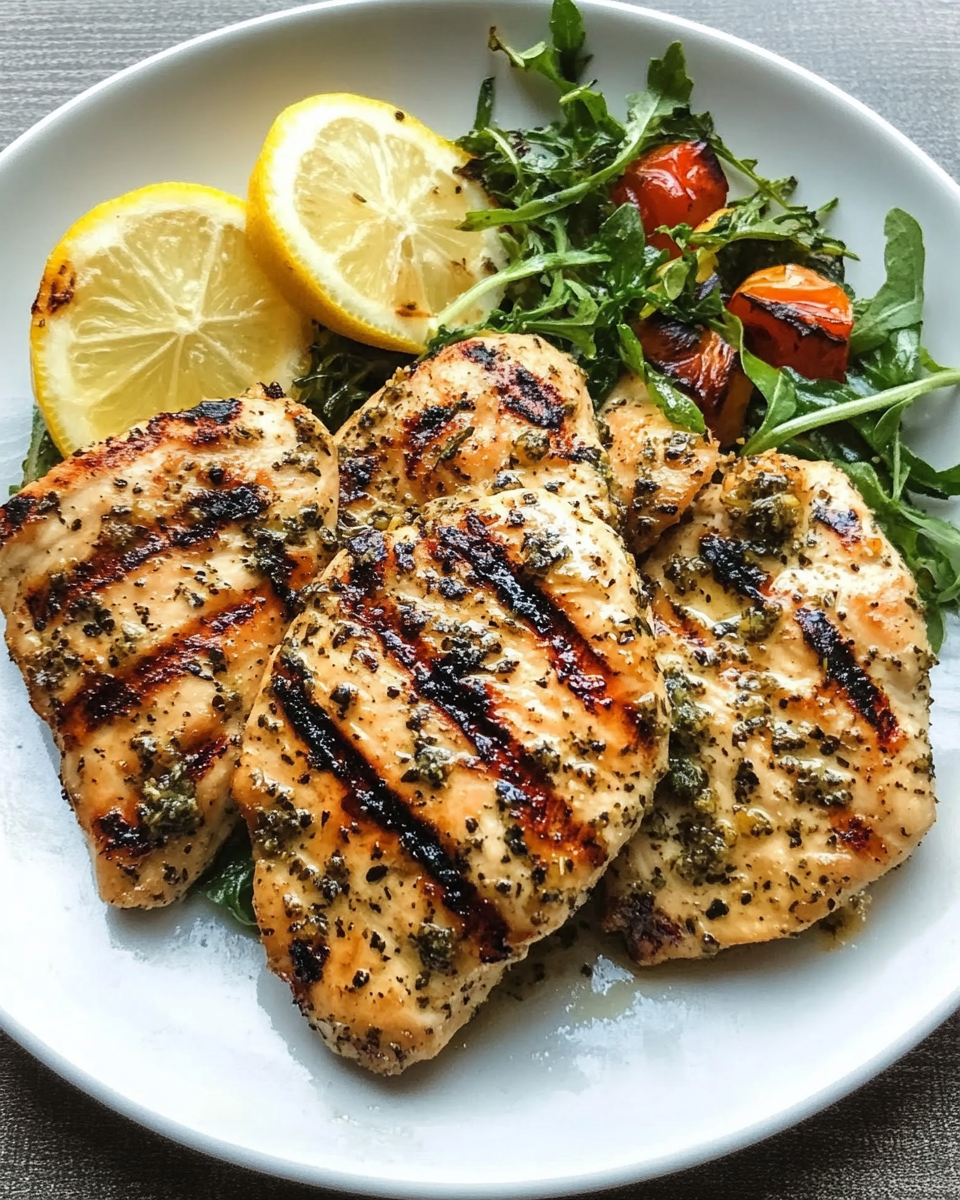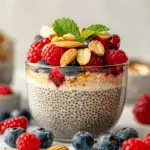A bright, flavorful dish perfect for healthy weeknight dinners or weekend grilling. This grilled lemon herb chicken breast is marinated in a zesty blend of lemon juice, garlic, and fresh herbs to keep the meat juicy and tender. Simple to prepare and packed with fresh flavor, it pairs well with salads, roasted vegetables, or rice.
FULL RECIPE
Ingredients
- 4 boneless, skinless chicken breasts
- 1/4 cup olive oil
- 1/4 cup fresh lemon juice
- 2 teaspoons lemon zest
- 3 garlic cloves, minced
- 1 tablespoon chopped fresh parsley
- 1 tablespoon chopped fresh basil
- 1 teaspoon chopped fresh thyme
- 1 teaspoon salt
- 1/2 teaspoon black pepper
Directions
- Pound the chicken breasts to an even thickness for uniform cooking.
- In a bowl, whisk together olive oil, lemon juice, lemon zest, garlic, parsley, basil, thyme, salt, and pepper.
- Place the chicken in a zip-top bag or shallow dish and pour the marinade over it. Seal or cover and refrigerate for at least 30 minutes, up to 2 hours.
- Preheat the grill to medium-high heat.
- Remove chicken from marinade and let excess drip off.
- Grill chicken for 6–7 minutes per side, or until internal temperature reaches 165°F.
- Let rest for 5 minutes before slicing and serving.
Nutritional Information
- Calories: 220 per serving
- Protein: 28g
- Fat: 10g
- Carbohydrates: 2g
- Fiber: 0.2g
- Sugar: 0.5g
- Sodium: 400mg
The Health Benefits of Grilled Lemon Herb Chicken
Grilled lemon herb chicken breast is not only delicious but also highly nutritious. Lean chicken breast is an excellent source of high-quality protein, which is essential for muscle repair and growth. This recipe uses fresh herbs and lemon, which add antioxidants and vitamins without extra calories or fat. The use of olive oil provides healthy monounsaturated fats, contributing to heart health. Grilling the chicken instead of frying reduces the amount of unhealthy fats and calories, making this dish a smart choice for those watching their weight or seeking a balanced diet.
Why Marinate Chicken?
Marinating chicken breast before grilling enhances flavor and tenderness. The acid in lemon juice helps break down proteins in the meat, which softens it and allows the chicken to absorb the aromatic herbs and spices. This process creates a juicy texture and deep flavor that plain grilled chicken lacks. Marinating also helps prevent the meat from drying out during cooking, especially with lean cuts like chicken breast.
The Role of Fresh Herbs
Fresh herbs like parsley, basil, and thyme provide a burst of freshness and complexity to this dish. Each herb contributes unique essential oils and antioxidants that can improve digestion and offer anti-inflammatory benefits. Using fresh herbs instead of dried spices elevates the flavor profile, making the chicken taste vibrant and garden-fresh, which enhances the overall eating experience.
The Importance of Lemon in the Recipe
Lemon juice and zest add brightness and acidity that balance the richness of the olive oil and the mild flavor of chicken breast. The citrus helps tenderize the meat and adds a refreshing, tangy note. Lemon is also a good source of vitamin C, which supports immune function and skin health. The zest contains essential oils that intensify the lemon aroma without adding acidity, making it a key flavor component.
Grilling Techniques for Perfect Chicken
Grilling chicken breast requires careful attention to temperature and timing. Medium-high heat ensures the chicken cooks evenly without burning the exterior. Turning the chicken once helps develop a beautiful sear and grill marks, enhancing the visual appeal and flavor. Using a meat thermometer ensures safety by confirming the chicken has reached an internal temperature of 165°F, preventing undercooking or drying out.
How to Achieve Juicy Chicken Breast
Juiciness can be tricky with lean chicken breast since it lacks fat. The marinade plays a vital role in moisture retention, as the oil and acid create a protective layer. Allowing the chicken to rest after grilling lets the juices redistribute throughout the meat, resulting in tender, moist bites. Avoiding overcooking is crucial because heat causes proteins to tighten and squeeze out moisture, which leads to dryness.
Pairing Ideas for Grilled Lemon Herb Chicken
This versatile chicken pairs well with a variety of side dishes. Fresh salads with vinaigrette complement the citrus flavors nicely. Roasted or steamed vegetables such as asparagus, broccoli, or green beans add color and nutrition. For a heartier meal, consider serving with quinoa, couscous, or brown rice to balance protein and carbohydrates. Light sauces like tzatziki or chimichurri also enhance flavor without overpowering the delicate herbs.
The Nutritional Profile of This Dish
This grilled chicken recipe provides a balanced nutrient profile, offering lean protein, healthy fats, and minimal carbohydrates. It is low in calories and contains no added sugars or processed ingredients, making it suitable for many dietary goals including weight loss, muscle building, and heart-healthy eating. The sodium content is moderate, depending on the amount of salt used, so it can be easily adjusted for low-sodium diets.
Adapting the Recipe for Different Diets
Grilled lemon herb chicken breast is naturally gluten-free, low-carb, and dairy-free, making it accessible for many dietary preferences. For those following keto or paleo diets, this dish fits well due to its emphasis on whole foods and healthy fats. Vegetarians and vegans can enjoy similar flavors by substituting grilled tofu or tempeh marinated in the same lemon herb mixture.
Using Olive Oil for Flavor and Health
Olive oil is the primary fat used in this recipe and is known for its heart-healthy benefits. Rich in antioxidants and anti-inflammatory compounds, extra virgin olive oil supports cardiovascular health and may help reduce the risk of chronic diseases. It also adds a smooth, fruity flavor that complements the herbs and lemon beautifully, enhancing the overall taste of the chicken.
Tips for Buying Quality Chicken Breast
Choosing fresh, high-quality chicken breast is essential for the best results. Look for skinless, boneless breasts that are firm, moist, and pale pink in color. Organic or free-range options are often preferred for better animal welfare and potentially higher nutrient content. Avoid chicken that smells sour or appears slimy, as these are signs of spoilage.
Storage and Leftover Ideas
Cooked grilled lemon herb chicken breast can be stored safely in the refrigerator for 3-4 days in an airtight container. It also freezes well for up to 3 months when wrapped tightly. Leftovers can be repurposed in sandwiches, salads, wraps, or pasta dishes, making it a convenient meal prep option for busy weeks.
Seasonal Variations and Herb Substitutions
While parsley, basil, and thyme are classic, this recipe is flexible with herbs. In colder months, rosemary or oregano can add warmth and earthiness. In summer, fresh cilantro or dill can bring a different bright flavor. Adjusting herbs based on seasonality ensures freshness and variety throughout the year.
Common Mistakes to Avoid
Overcooking the chicken is a frequent error that leads to dryness. Using a meat thermometer helps prevent this. Skipping the marinade or not allowing enough time to marinate reduces flavor penetration. Another mistake is grilling on too high heat, which can burn the outside while leaving the inside undercooked. Patting chicken dry before grilling helps achieve proper searing.
How to Serve for Entertaining
Grilled lemon herb chicken breast is elegant enough for dinner parties and casual enough for weeknights. Serve sliced on a large platter with garnishes of fresh lemon wedges and herbs to impress guests. Pair it with colorful side dishes and a crisp white wine for a memorable meal. The recipe’s fresh flavors appeal to a wide audience, making it ideal for gatherings.
The Environmental Impact of Chicken
Chicken generally has a lower environmental footprint compared to red meats like beef or lamb. It requires less water and land and produces fewer greenhouse gases. Choosing sustainably raised chicken or local sources can further reduce environmental impact, aligning this dish with eco-friendly eating practices.
The Cultural Popularity of Lemon and Herbs in Cooking
The combination of lemon and fresh herbs is a timeless culinary tradition found in Mediterranean, Middle Eastern, and many other cuisines. This flavor pairing highlights simplicity, freshness, and balance. Using these ingredients in chicken dishes creates an accessible taste experience appreciated worldwide.
How to Customize Spices
For added heat, a pinch of crushed red pepper flakes or smoked paprika can be included in the marinade. To introduce sweetness, a touch of honey or maple syrup balances the acidity of lemon. Experimenting with spices like cumin, coriander, or garlic powder personalizes the dish while keeping the core flavor intact.
The Science Behind Meat Tenderization
Acidic ingredients like lemon juice break down muscle fibers and proteins, tenderizing the meat on a molecular level. This process, combined with mechanical action such as pounding the chicken, improves texture and flavor absorption. Timing is important, as over-marinating can make the meat mushy.
Conclusion
Grilled lemon herb chicken breast is a flavorful, nutritious, and versatile dish that fits seamlessly into healthy eating habits. Its simple ingredients deliver complex tastes, while the cooking method preserves juiciness and tenderness. Whether served for a casual family dinner or a special occasion, this recipe offers balance, freshness, and satisfaction. With easy customization options and broad appeal, it remains a favorite for cooks of all skill levels seeking a wholesome and delicious meal.






